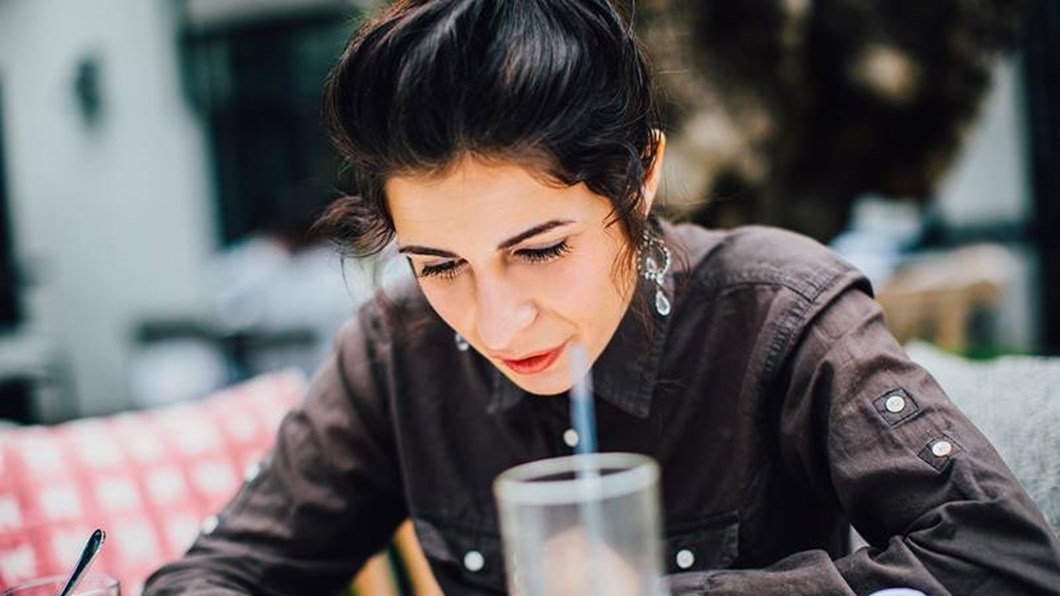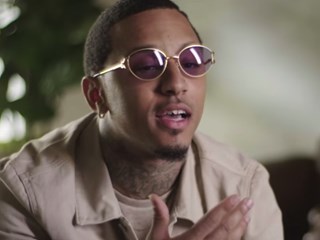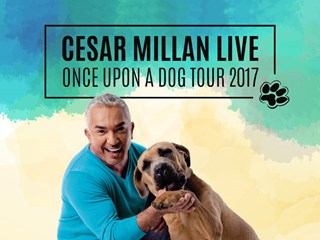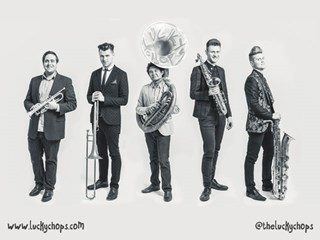"I'm one of those people who thinks everything happens for a reason," Annabel Jones tells me over lunch in Los Angeles. "You might not know the reason—it might be your great-grandchildren that find it out—but there is always a reason." Considering the trajectory Jones' career has taken, it's easy to understand her worldview. At 27-years-old, the singer, songwriter, and pianist has already experienced her fair share of heartbreaks and setbacks, from a bittersweet run with the folksy duo Bluebell to a short and eye-opening stint as a behind-the-scenes songwriter.
Earlier this month, Jones released her debut EP, Libelle, on Atlantic Records. The five-song collection, co-produced by Jimmy Tamborello (The Postal Service, Dntel) and Andrew Goldstein (Robert DeLong, Krewella, Andrew McMahon) is a joyous, electro-pop showcase of Jones' sweet voice and fiery lyrics, anchored by a whole lot of attitude. (See lead the defiant drum and bass-twinged single "IOU") In between Jones' first live shows four years—at Los Angeles' Bardot and No Vacancy—we sat the Londoner down for a meal of vegan Mexican food (yes, it's a thing) to talk heartbreak, health food, and how she learned to trust her instincts.
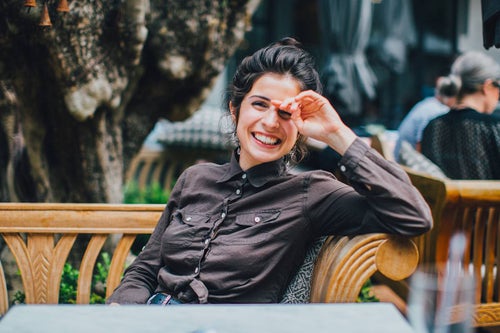
You played Bardot last night. How did it go?
It was good. I was so nervous. It was my first show in four years, so got up there and I felt like I was going to puke, I felt like I was going to faint. After the first chorus I was fine—I think the vodka started working [laughs]. It's fight or flight up there and your instincts kick in. It's like you're one animal and there's a pack of them in front of you and you have to choose between running away and staying and fighting for it. I was lying in bed last night and I was so tired, but my adrenaline was going. I thought to myself, 'This is going to be my life every night.' I'm going to learn to meditate [laughs]. I'm very bad at it, but I'm going to learn how.
What were you doing for those four years in between gigs?
I was in a band that I sort of fell into by accident. I put a demo together and it got spread around and I started getting messages from labels and stuff, and then people started blogging about it. It was me and my friend Charlie, so we figured, 'OK, let's give it a try.' There was also a spell before that where I thought I was going to quit trying to be an artist, so I just did songwriting for other people for a year, and it was really horrible. It was not for me at all. I got to a point where I was just convinced no one was going to sign me, so I wanted to teach myself to write pop music. I did a couple sessions and some writing camps for TV music, and nothing really came of it, but I'm really happy I did it because I know now that I could never be a jobbing songwriter. I am a free range organic type of person, and that is not that environment. As an artist, I'm too selfish.
After that I did Bluebell for a couple years, and we toured a lot, and then Charlie's brother tragically died in an accident, and then my dad [Monkees singer Davy Jones] died. I spent about 18 months just crying and not doing anything. Then there was this period where I just started questioning everything and Charlie started questioning everything and we just decided not to do it anymore. We were both very tired. Eventually I just started writing on my own. I've been working with Evan Bogart and Emanuel Kiriakoufor three years, so I've been coming over here and working on music, but it's been a slow building process.
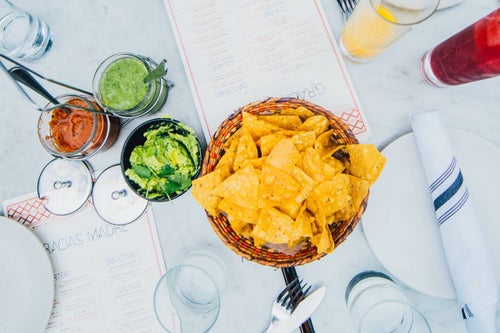
How did you link up with Jimmy Tamborello?
As a teenager I was a huge fan of the Postal Service. They were just a huge part of my upbringing, and I really don't have that with a lot of bands. There was this guy working at the smaller label I'm signed to and his friend was Jimmy's manager. We were talking about who I wanted to work with and Jimmy was on the list, but they told me that he was never going to do it—he doesn't work on much, he never leaves his house, it's not his vibe, whatever. Then he responded and we all freaked out . He came and met us and I was so weird with him. He's very quiet, so I just kept talking and talking. But something must have worked because he decided he wanted to work on the EP. It's been so cool. He's a true artist, zero fucks given. We sent him our demos—sometimes a track that was built, sometimes it was just vocals—and it was the equivalent of us sending him photorealism and him sending back Picasso. It's amazing. He works in a way that people just don't work anymore.
How does working in Los Angeles compare to working in London?
All I listen to is hip-hop radio when I'm here, which is weird. I've found the studio environment very inspiring. I feel like I'm a fly on the wall there, watching people chat in the kitchen, seeing how different people interact. That's the cool thing about the studio—it brings together a lot of people who would probably never interact with one another. It's crazy. Future's there a lot. Lil Wayne, Chris Brown, one time Puff Daddy was there and he bought everyone ice cream. That was an L.A. moment.
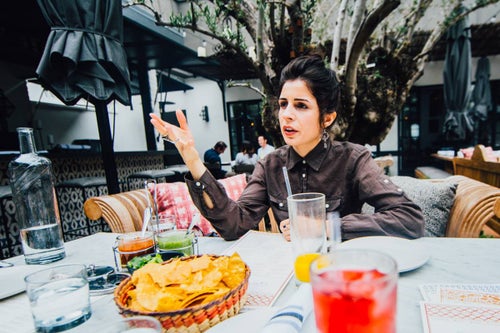
Do you feel like being here has affected your music?
I think so. When I'm in London I write a lot more piano-based, singer-songwriter, folksy stuff. Being around people in the studio, there's beats coming out of every room, there's a lot of socializing, there's a lot of weed, it's just different. But it's become so comfortable. It's my safe place when I'm here.
I feel like London gets a pretty bad rap, food-wise.
We get a really bad wrap. I think the food in London is amazing. We have amazing curries and Pan-Asian food, loads of really good Japanese food. Also, our traditional food is real good. I love peasant food, though. I'm not a fancy food person, though. Give me pasta, give me starch, give me carbs and cheese and meat. If something's red or white, I'm in. ... I did vegan, grain free, sugar free for a year and I looked really good, but I felt horrible. It was literally the only time in my life I had healthy nails, healthy skin, I didn't have a single bit of cellulite—it totally changed my body, and for the better. Now I know what things I can't eat, like most grains I can only have a little bit.
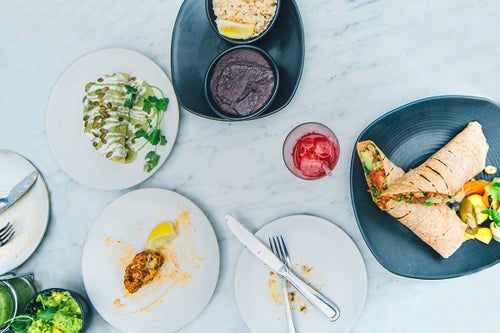
Did you always know you wanted to do music?
Yes. I think there was a moment when I was younger where I wanted to be an archeologist, but it lasted for like one afternoon. I also wanted to be Pocahontas. But as a serious career choice, it was always music. I remember when I was 7 or 8 and sitting in school they went around the room and asked everyone what they wanted to be when they grew up and I said "pop star." Everyone busted out laughing. It was love or hate after that—the other kids either loved me or they hated me.
There's a really refreshing, strong, defiant feel to the songs on the EP. Do you feel like there's a theme to the songs you're writing now?
I think so. I'm talking about how what you think you want or what you have isn't necessarily what's best for you. Also, anything that can make you feel more empowered as a person will set you free. Anything that makes you feel like you can do you, that's what I want, and that's what I want other people to get out of it.

